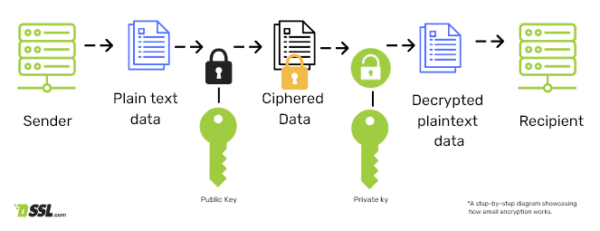So, How Email Encryption Works?
So, how can you build this protective bunker? The answer lies in email encryption. It’s like a secret code that only you and your intended recipient know. It transforms the data in your emails into unreadable text for anyone without the correct decryption key, which means only your intended recipient can read your email. This is akin to sending a sealed letter instead of an open postcard. It’s like having a secret handshake that only you and your friend know. Anyone else who tries to mimic the handshake will fail, just like anyone who tries to read your encrypted email without the decryption key.
Understanding the Benefits of Email Encryption
- Malicious Email Attachments. Harmful scripts can be delivered as attachments that execute right on your computer when you open them. Email signing certificates are extremely useful in verifying the sender’s identity so you can be assured that the message is from a trusted source.
- Spoofing. Cybercriminals can fake a return address on an email to make it look as though the message came from a trusted account. Email signing certificates can be used to prevent this type of attack by ensuring that every employee within your organization is signing their emails to indicate trust.
- Eavesdropping. Cyber attackers can intercept the data between your computer and the receiver’s. With encrypted email communication, the information can’t be read by anyone unless they have the private key.
- Spamming and Phishing. Unsolicited spam mails from advertisers are simply junk mails that clutter your mailbox. However, phishing emails pose a serious security threat. They often imitate legitimate entities with the intention of stealing your private information like banking details and credentials. Encryption adds a layer of protection against these threats.
- Data Breaches. In cases of data breaches, cybercriminals can gain unauthorized access to your email content. Encrypted emails make it significantly harder for such breaches to occur, as the data is unreadable without the decryption key.
- Identity Theft. When personal information is stolen, it can be used to commit fraud or other crimes in your name. Encrypting emails helps to protect your personal information from being stolen and used for identity theft.
Communicate securely and protect your email communications with S/MIME certificates from SSL.com. Safeguard sensitive information, authenticate sender identity, and ensure privacy. Take control of your email security now!
Use Cases and Examples Email Encryption
Introducing SSL.com’s S/MIME Certificates
Why Choose SSL.com’s S/MIME Certificates for Email Encryption?
But why should you choose SSL.com’s S/MIME certificates for your secret handshake? Besides its compatibility with major email client software applications and email services, SSL.com’s S/MIME certificates excel in their user-friendly interface. This makes secure email communication accessible to everyone, no matter their level of technical skills. Additionally, they provide industry-grade encryption and client authentication capability, ensuring that only verified individuals or organizations can access your systems. It’s like having a secret handshake that’s easy to learn but impossible to crack.Communicate securely and protect your email communications with S/MIME certificates from SSL.com. Safeguard sensitive information, authenticate sender identity, and ensure privacy. Take control of your email security now!